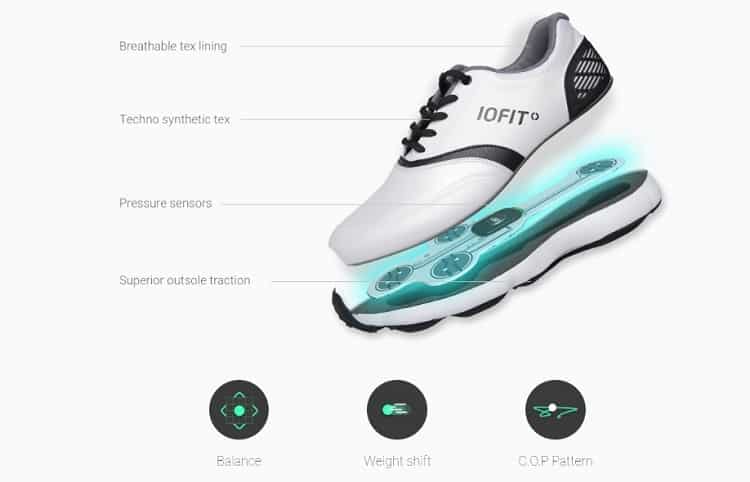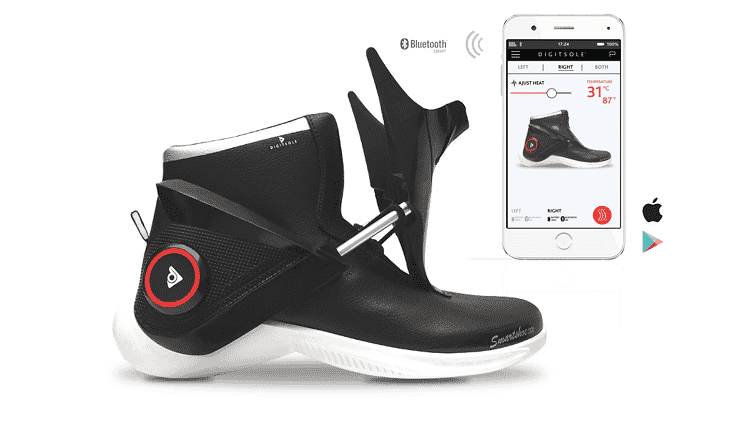11 Smart Shoes That Are Digitally Connected
Table of contents
Table of contents

It looks like we’re getting closer to a world like the one portrayed in Back to the Future with smart homes, smart luggage, and smart sports stadiums all becoming a reality. Now, one of the latest fads from the future is smart shoes – the type integrated with high-tech features, not the type you wear to those insufferable workplace “black tie events” that all the ladies in human resources get so excited about. Basically, smart shoes are technologically advanced wearables that record biometric data, allowing users to review the information via apps, and sending suggestions on how the wearer can live a better, even more complicated life.
We’ve been seeing a fair amount of news coming out lately about smart shoes, just a few items of which can be seen below:
- Nike HyperAdapt is gearing up to introduce the second generation of its self-lacing shoes which uses Nike E.A.R.L. (Electric Adaptable Reaction Lacing) technology that allows the footwear to adjust to the contours of your foot.
- Xiaomi has the Mijia Smart Shoes which are powered by an Intel Curie module based on the Quark SE system and has sensors that can rival Nike+ at a cheaper price point.
- Under Armour has developed their Connected sneakers series designed for “zero gravity feel” with Energy Web technology that gives back the same level of energy you exert in every stride.
It’s not just some of the world’s biggest shoe brands that are developing smart shoes, there are also a fair number of startups developing shoes. Let’s take a look at some startups looking to further advance the smart shoe market today.
Smart Shoes For Health
Founded in 2015, French startup FeetMe has taken in $2.3 million in funding so far to develop FeetMe Sport. Although the company offers practically the same features as the other smart shoemakers, FeetMe holds higher credibility when it comes to the health-related aspects of the show. Prior to FeetMe Sport, they had already released a connected insole called FeetMe Diagnosis which zeroed in on post-surgical evaluation and patient analysis. This means FeetMe Sport is a lateral move to utilize their medical know-how and technology in a new application.

The FeetMe insoles are covered with 25 pressure sensors, dwarfing the two to three sensors you’ll see integrated into a run-of-the-mill pair of smart shoes. This means that the entire insole and the entire foot is covered by sensors, allowing for a deeper analysis of the user’s performance. Despite the coverage of its sensors, the entire package only weighs roughly 80g per insole (that’s less than three ounces).
Like FeetMe Sport, Seoul startup 3L Labs has developed a fitness tracking device that also aims to detect health problems early on. The smart shoes, called FootLogger, make use of the biometric data gathered from its user to send suggestions on how to improve gait, diagnose potential diseases, and improve athletic performance. It has eight sensors paired with one accelerometer to aid in recording the wearer’s exercise habits.

The FootLogger, which has a memory capacity of up to 50,000 footprints, sends the data to the user either via text message or allows the data to be accessed through a smartphone app. The smart shoes can also help with patient rehabilitation, particularly for spinal or nervous system concerns, and can be used to spot early symptoms of arthritis and dementia as well.
Founded in 2017, French startup E-vone has taken in an undisclosed amount in funding so far to design a connected shoe that features a falling alert system. Basically, these shoes cater to four types of users: the elderly, outdoor adventurers, blue-collar workers, and people who don’t know when to stop drinking.

Using the built-in sensors, the shoes are capable of detecting “abnormal” movements, such as a fall or slip, and trigger a pre-programmed alarm. With its GPS system, the E-vone shoes can send the geolocation to the nominated family member or friend registered by the user. A vibration in the soles will serve as a notification to inform the user that help is on the way. The shoes can also detect if the user manages to get back on his feet and offers the option of turning off the alert.
Smart Shoes for Sports


They also claim to be as effective as a golf coach because of the real-time feedback they send their users. Some of the data you can see via their app, IOFIT Golf, includes center of pressure, foot pressure distribution, and left/right balance. Users can also view swing data from players in the PGA and LPGA to compare their performance to those of the pros.


Aside from the usual features found in smart shoes, the 2015 startup also integrated a virtual health assistant called “B.” These shoes can analyze performance metrics for a variety of field sports like hockey and soccer. Boltt partnered with wearable sensors maker Garmin to help them create sensors capable of recording complete body data.
Founded in 2014, Lorraine, France startup Digitsole has taken in an undisclosed amount in funding so far to develop smart shoes that come with the standard activity trackers like gait and calorie burn. However, one of its unique features is its built-in heating system. The shoes can actually be heated up to 110 degrees Fahrenheit. That’s not the only advantage it has though over its competitors.

The real kicker for Digitsole is its tightening tech. Instead of creating “self-lacing” shoes, the startup designed footwear with a tongue-like cover which then closes and tightens around the foot. Users can easily activate it using the accompanying app or through a button located on the side of the shoe.
If you already have a pair of shoes you love and want to make them “smart,” our next startup might be able to help. Founded in 2013, San Francisco startup Scribe Labs has taken in an undisclosed amount of funding so far to develop RunScribe Plus, a running wearable that offers a 3D view of an athlete’s performance including data on a runner’s stride rate, contact time, and foot strike type.

The shoes have two pods that are mounted on either the heels or laces. Considering that the company’s founders were both members of the US Olympic Training Center team that designed a cycling model using 3D clips and power pedals, it comes as no surprise that accuracy and precision are at the forefront of their products. For example, the smart shoes utilize nine-axis motion sensors to fine tune their motion tracking feature. On top of these, RunScribe also provides power metrics that allow users to monitor the amount of energy needed to maintain their pace no matter how the terrain changes.
A Smart Shoe Exit
We’ve talked plenty of time before about the importance of adopting an investment strategy that can weather anything the market can throw at it consistently over time. One such strategy is Dividend Growth Investing (DGI)
, and one great stock that fits this strategy is VF Corporation (VFC) which has managed to increase dividends for 46 years straight. Similar to other DGI stalwarts like Walmart or Johnson & Johnson, VF Corporation manages a portfolio of apparel businesses including popular brands such as Timberland, The North Face, and Vans. Last year, VFC acquired a Utah smart shoe startup called Altra Footwear which was selling the Altra Torin IQ, “the first Zero Drop, fully cushioned, foot-shaped, gender-specific footwear line.”

These smarts shoes have pressure sensors, a microchip, and a battery inside the midsole allowing them to record footfall, impact, cadence, and other biometric data. This is a great vote of confidence for the other startups in our list who will be looking for exits down the road.
Conclusion
As electronic components become cheaper and cheaper, and new technologies emerge like chips that can power themselves using Wi-Fi signals, it seems likely that every piece of clothing we wear will be digitally connected to “the cloud.” After all, this is what the Internet of Things (IoT) is all about. Soon you’ll be able to ask your closet questions like “suggest a running outfit for this afternoon that matches my favorite purple running shoes” – if you’re the sort of person that has that much time on their hands and actually cares about what other people think. For runners, these shoes provide an endless amount of data that can be used to bore other runners to death. Admittedly, many of these smart shoes are largely solving first world problems, but it looks like this is the direction shoes are moving in and that there’s a lot of money to be made in this space.
Sign up to our newsletter to get more of our great research delivered straight to your inbox!
Nanalyze Weekly includes useful insights written by our team of underpaid MBAs, research on new disruptive technology stocks flying under the radar, and summaries of our recent research. Always 100% free.















I can’t walk more then 10 feet without falling. What kind of b-shoe should i get and how much would they cost?
We’re just a media firm so unfortunately have nothing of value to add here 😉
Ncijv c
English gonna be what we banter with around these ere parts.